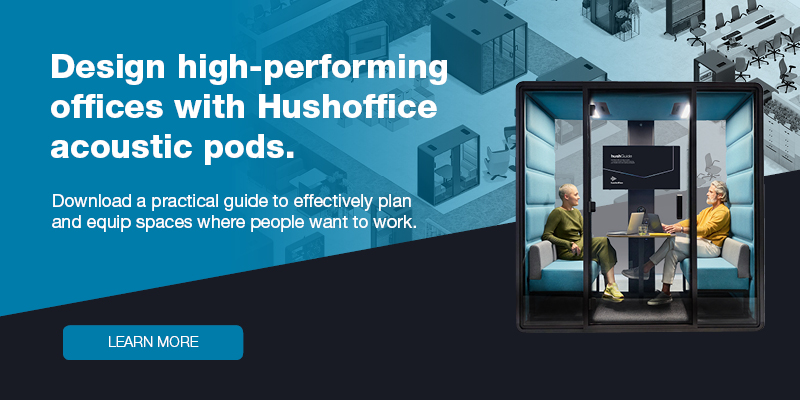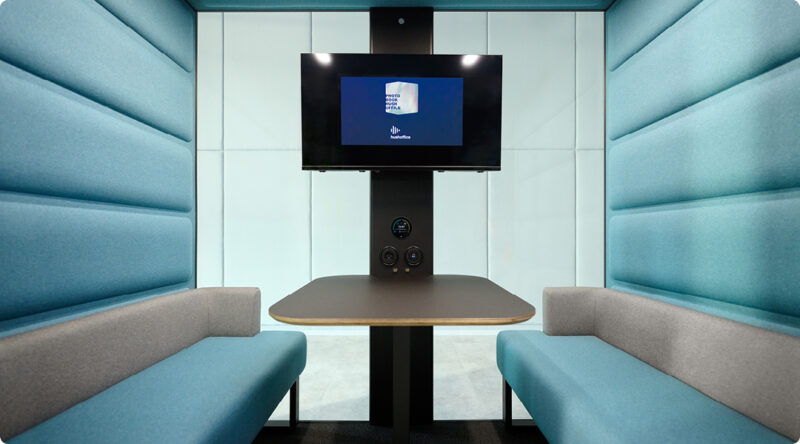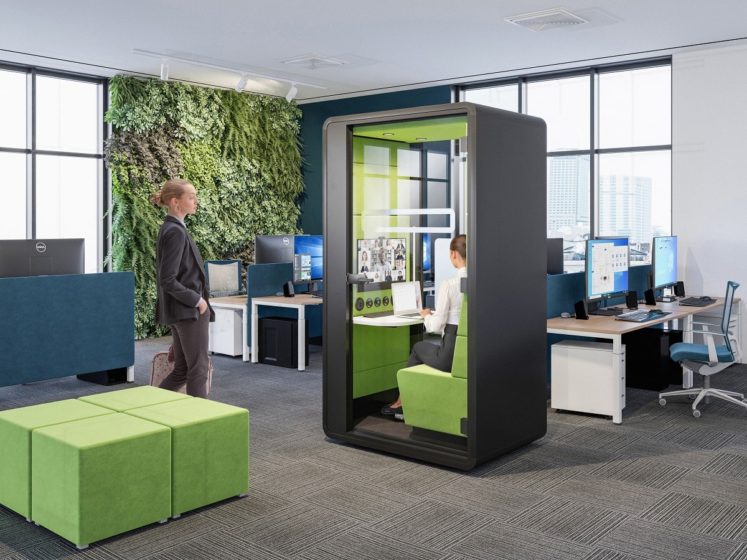Effective workspace management with acoustic booths
- Posted on: 25 October 2024
- By: Hushoffice Team
Acoustic booths are gaining traction as a versatile solution, ideal for facilities managers and workspace coordinators. In today’s hybrid offices, where flexibility and adaptability are priorities, pods and booths provide a comprehensive answer to complex spatial challenges.
Office management with acoustic booths – tl;dr
- Facilities and workspace managers are in charge of optimisation, employee well-being, and space planning. While their roles may differ, both concentrate on creating a supportive, efficient environment for all employees.
- Acoustic office booths, such as hushFree, offer a versatile, comprehensive solution for creating calm spaces where background noise is minimised. They allow employees to focus fully on their tasks and engage in confidential discussions in a distraction-free environment.
- HushFree booths offer dual advantages: facilities managers may use them to enhance the overall workspace layout, while office administrators may introduce them to improve employee well-being and performance.
Although facilities and office managers have distinct areas of expertise, their responsibilities overlap in some aspects, including efficiency, optimal space and infrastructure management, and employee well-being. In fact, both professionals work to develop robust, strategic solutions to meet the emerging demands of hybrid environments. Work booths can be a fundamental part of a successful workspace by providing private, acoustic spaces that help facilities operators optimise office layouts, while enabling office managers to enhance employee health and performance. Their dual advantage is what makes acoustic booths a highly effective tool for space management and optimisation – says Mateusz Barczyk, Senior Brand Manager, Hushoffice.
Facilities managers are the driving force behind successful workplaces.
Where most people see walls and systems, facilities managers see opportunities for improvement and transformation. Their commitment and attention to detail help effectively support employee productivity and well-being in the workspace, making them masterminds behind a team’s daily success.
Administering the workspace…
Facilities managers arrange office spaces to strike a balance between collaboration and privacy. With the increasing popularity of hybrid work, this task has become particularly challenging as they must cope with fluctuating occupancy levels and create flexible zones for both in-office and remote work, such as calm areas for video conferencing, and collaborative areas for dynamic team interactions.
Managing technical infrastructure…
With today’s growing demand for sustainable solutions, facilities managers are encouraged to implement more eco-friendly measures, including smart, energy-saving technologies while maintaining optimal workspace conditions. This is especially important as organisations work towards green certifications and strive to meet sustainability goals.

Strategically managing the infrastructure maintenance budget…
Facilities managers must strike a balance between cost-saving and preventative maintenance. Reduced office spaces and increasing costs in high-density areas add to this challenge, making it necessary to seek multi-faceted solutions, such as modular arrangements, while carefully planning to prevent costly repairs.

Managing Occupational Safety and Health (OSH)…
With a growing focus on well-being, facilities managers integrate health into every aspect of the workspace, mitigating both physical and emotional dangers. This includes enhancing acoustics in noisy areas, prioritising ergonomics, and creating relaxation areas to minimise burnout and promote overall wellness.
Making workspaces future-ready with adaptable solutions…
Today, facilities supervisors are more frequently incorporating mobile elements, such as mobile work booths, and customisable furnishings that can be easily adjusted to individual preferences. Thanks to this flexibility, workers can create optimal environments for their tasks, ensuring an accessible workspace whenever they need.
Office managers – the creators of relaxed and productive work environments.
While facilities managers oversee the structural integrity and functionality of the office, office managers focus on human experience, creating a balanced sensory environment. Managing these complexities, they play a crucial role in designing inclusive workspaces that cater to everyone.

Optimising workspace for fluctuating employee numbers…
In today’s hybrid work world, the office layout must adapt to the fluctuating staff numbers. Designing universal spaces that facilitate effortless transitions between various setups is crucial for ensuring space efficiency and employee comfort, whether working in the office or remotely.
Universal design – designing workspaces to accommodate diverse employee needs…
In the modern work world, office managers are designing environments that accommodate an increasingly diverse range of work styles, sensory sensitivities, and accessibility needs. The priority is neurodiversity and a genuine commitment to mental well-being. That’s why elements such as quiet work booths and modular furnishings are gaining momentum.
Striking a balance between private and collaborative spaces…
Balancing “me” and “we” time is becoming increasingly challenging in the era of remote work and the growing need for well-being initiatives. As employees search for private spaces to focus, only to prioritise social interactions a moment later, the office must provide a diverse range of work settings to meet these needs.
Supporting in-office and remote work…
This means incorporating technological solutions and tools that encourage spontaneous collaboration. Both remote and in-office team members should be connected – technologically and emotionally. At the same time, each employee needs extra care and attention as the boundary between professional and home life has become increasingly blurred.

For office management specialists, acoustics are crucial.
Every professional responsible for daily workspace operations or employee well-being perfectly understands the profound impact sound has on worker satisfaction and performance. Regarding sensory factors, high-quality acoustics lay the groundwork for effective workspace management.
How to manage noise in open-plan workspaces?
Through careful assessment of the acoustic needs of different workspace areas, office managers can create environments that strike a balance between collaborative and focused work. While shared zones bustle with vibrant sound, quiet areas should be soundproofed to ensure maximum concentration. Acoustic solutions, such as noise-reducing panels and thoughtful furniture configuration can help mitigate background distractions. Pods, which serve as soundproof islands of peace, ensure privacy by cancelling out backdrop commotion and keeping discussions confidential – says Mateusz Barczyk, Senior Brand Manager, Hushoffice.
By reducing distractions, employee creativity and focus are improved, fostering an atmosphere of commitment and emotional wellness. In this way, a thoughtfully designed acoustic environment can significantly boost team mood and morale, contributing to success.
Acoustic booths and pods, such as hushFree, are an excellent solution.
They absorb noise. They offer private spaces for concentrative tasks and focused meetings. They enhance performance. They allow team members to work interrupted. And with their modular design, they easily adapt to various environments, adding flexibility to the layout.

What technological solutions can support office space management?
Like a skillfully composed piece of music that balances structure and flexibility, top-notch office space management solutions are defined by framework and metrics that actively support adaptability.
Building Management Systems (BMS).
Building Management Systems help identify inefficient energy use and maintenance needs, allowing organisations to meet sustainability goals and reduce expenses. By dimming lighting in unoccupied spaces or modifying temperature levels based on workspace occupancy, BMS contributes to a comfortable environment adjusted to the daily office workflow.

Analysing occupancy levels.
Sensors and Internet-of-Things (IoT) devices monitor workspace usage, collecting information about occupancy levels and peak activity times. These data are particularly useful for supervisors, allowing them to assess trends and optimise space distribution and adjust layouts to accommodate evolving needs.
Using booking systems to reserve workspace and meeting rooms.
Features such as hushAssistant or hushBooking allow workers to book in advance, helping to prevent overcrowding while also enabling managers to monitor and assess demand. With time, space arrangements may be adjusted based on actual usage, leading to a more efficient and user-friendly work environment.

HushFree booths are all-in-one, bookable spaces that enhance both functionality and comfort.
From the single-person hushFree.S call booth to the hushFree.Access.L wheelchair-friendly meeting booth accommodating up to six individuals, the hushFree collection offers numerous benefits to office supervisors and operators.
HushFree.S ensures psychological comfort.
With adjustable lighting and ventilation, hushFree.S enables workers to fine-tune their workspace, enhancing comfort and promoting a greater sense of harmony. Thus personal control encourages increased accountability and satisfaction in completing even simple tasks.
Privacy plays a crucial role in ergonomics. The hushFree.M 4-person meeting booth is an excellent choice.
In the workplace, privacy equals ergonomic ease. Offering employees personal space and ensuring discretion contribute to a secure work environment while reducing anxiety. It also plays a crucial role in ensuring confidentiality. HushFree.M is a work booth that provides complete privacy.
If you need a compact, mobile space for collaboration, consider hushFree.L.
Its spacious interior provides ample room to move, while its acoustic insulation and cocoon-like design encourage workers to engage freely, collaborating without restraint. HushFree.L offers these benefits without taking up valuable space.
With hushFree.Access.M, accessibility begins the moment you step inside.
The booth combines all the best hushFree features and an extra advantage of wheelchair accessibility, thanks to its threshold-free flooring. HushFree.Access.M is an excellent solution for space planners and managers, offering accessibility through a primary work and collaboration space.
Find out more about our hushFree accessibility booths: Get accessible with hushFree.Access pods.
A productive workspace is developed from scratch with the focus on individual success and team unity. By incorporating smart solutions, such as acoustic booths, supervisors can provide employees with multifunctional workspaces that support productivity and employee well-being, ultimately enhancing the overall team performance. And these spaces are not only private rooms, but they also function as powerful tools for ensuring focus, energy, and commitment. The magic of office pods lies in their ability to align with both the space optimisation goals of facilities managers and the office administrators’ efforts to foster well-being, making them the ideal all-in-one solution
– says Mateusz Barczyk, Senior Brand Manager, Hushoffice.
Office management with acoustic booths – tl;dr
- Facilities and workspace managers are in charge of optimisation, employee well-being, and space planning. While their roles may differ, both concentrate on creating a supportive, efficient environment for all employees.
- Acoustic office booths, such as hushFree, offer a versatile, comprehensive solution for creating calm spaces where background noise is minimised. They allow employees to focus fully on their tasks and engage in confidential discussions in a distraction-free environment.
- HushFree booths offer dual advantages: facilities managers may use them to enhance the overall workspace layout, while office administrators may introduce them to improve employee well-being and performance.
Office management with acoustic pods – Frequently Asked Questions
What are the advantages of introducing acoustic booths into hybrid work environments?
Acoustic booths are an ideal solution for flexible workspace arrangements, offering calm, easily adaptable spaces. By accommodating various work styles, they also help manage changing staff numbers effectively.
How can hybrid workspaces ensure both flexibility and privacy?
Acoustic office booths offer easily adaptable, private spaces ideal for collaborative and focused efforts. They are an excellent choice for hybrid work environments where both privacy and agility are top priorities, helping to accommodate diverse work styles and evolving team structures.
How can acoustic pods improve space efficiency in smaller workspaces?
Thanks to their compact size, acoustic pods can fit into underutilised areas, effectively extending the available office space. They serve as efficient, all-in-one workspaces for focused work and productive meetings, eliminating the need for large conference rooms.







